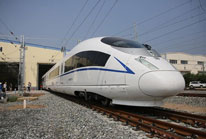

High-ranking diplomats from China, Japan and South Korea had a discussion on Sunday about the agenda and schedule of an upcoming meeting of their foreign ministers this week. The escalating tensions due to the Diaoyu Islands disputes between China and Japan and the deployment of the US Terminal High Altitude Area Defense (THAAD) system in South Korea have heavily overshadowed the meeting.
The trilateral relationship is at its worst point for many years. Most experts and pundits agree that the situation is not in line with regional interests, but few of them can come up with feasible plans to remedy it.
The foreign ministers' meeting cannot be expected to produce anything significant. It is enough that the meeting is able to soothe the tensions and promote the symbolic value of talks.
However, the standoff in Northeast Asia has even made it hard to avoid an eventual physical confrontation between China and Japan. Many people believe that the US rebalance to the Asia-Pacific is the culprit. But Washington won't help Northeast Asia put an end to the estrangement in the region. On the contrary, the US has found it easy to instigate a fight between China, Japan and South Korea, and it will keep doing so.
All three know the standoff will lead to a circumstance that can harm all of them, but none of them have the willpower to break it. Thus, the current tensions cannot be ended in the short term.
Both Japan and South Korea demand China make major concessions: For Japan, it hopes China can stop raising WWII history to challenge Japan, greatly reduce the activity of the Chinese coast guard near the Diaoyu Islands, and will support Japan becoming a permanent member of the UN Security Council; South Korea hopes China can impose heavy sanctions on North Korea, and drop its objections to the deployment of THAAD.
These concessions are unacceptable for China and the Chinese people. Beijing hopes Japan and South Korea can exercise enough restraint and stop stirring up tensions. However, it is also impossible for Tokyo and Seoul to compromise as Beijing expects.
Since no party is willing to step back, risk management has become the most important and practical task for all three countries. Since economic cooperation between China and South Korea can hardly avoid being damaged, Beijing and Seoul should bear in the mind the importance of reducing political instigation. China and Japan should try their best to keep away from physical confrontation, and if it happens, both sides must make sure there won't be a full-blown war.
Due to a lot of limitations, Northeast Asia cannot move to full-fledged cooperation any time soon. The three countries will have to endure these ups and downs.
Thus, we shouldn't lay too much hope on the prospect of regional cooperation, so that we won't be too disappointed when things go wrong. The stability of Northeast Asia could be built on low expectations.
 World's fastest bullet train to start operating next month
World's fastest bullet train to start operating next month Huangluo: China's 'long hair village'
Huangluo: China's 'long hair village' Spectacular bridge with one of the tallest piers in the world
Spectacular bridge with one of the tallest piers in the world Magnificent view of Hukou Waterfall
Magnificent view of Hukou Waterfall A glimpse of Stride 2016 Zhurihe B military drill
A glimpse of Stride 2016 Zhurihe B military drill US Navy chief tours Liaoning aircraft carrier
US Navy chief tours Liaoning aircraft carrier Chinese American woman wins Miss Michigan
Chinese American woman wins Miss Michigan Centenarian couple takes first wedding photos
Centenarian couple takes first wedding photos Traditional Tibetan costumes presented during fashion show
Traditional Tibetan costumes presented during fashion show Top 10 livable Chinese cities
Top 10 livable Chinese cities Top 20 hottest women in the world in 2014
Top 20 hottest women in the world in 2014 Top 10 hardest languages to learn
Top 10 hardest languages to learn China’s Top 10 Unique Bridges, Highways and Roads
China’s Top 10 Unique Bridges, Highways and Roads Pragmatism raises hope for Myitsone Dam
Pragmatism raises hope for Myitsone Dam Chinese Catholics split over cardinal’s article about China-Vatican negotiations
Chinese Catholics split over cardinal’s article about China-Vatican negotiations Helpful hacker forums close after arrest for revealing vulnerabilities
Helpful hacker forums close after arrest for revealing vulnerabilities 'Born in China' uses drama and cute animals to promote environmental message
'Born in China' uses drama and cute animals to promote environmental messageDay|Week